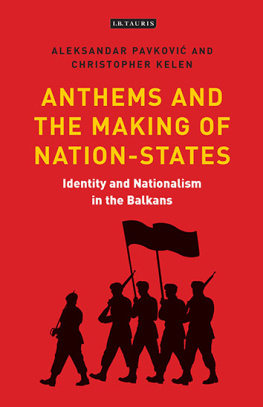The Serbs and Their Leaders in the Twentieth Century
First published 1997 by Ashgate Publishing
Reissued 2018 by Routledge
2 Park Square, Milton Park, Abingdon, Oxon, OX14 4RN
52 Vanderbilt Avenue, New York, NY 10017
Routledge is an imprint of the Taylor & Francis Group, an informa business
Copyright Peter Radan, Aleksandar Pavkovi 1997
All rights reserved. No part of this book may be reprinted or reproduced or utilised in any form or by any electronic, mechanical, or other means, now known or hereafter invented, including photocopying and recording, or in any information storage or retrieval system, without permission in writing from the publishers.
Notice:
Product or corporate names may be trademarks or registered trademarks, and are used only for identification and explanation without intent to infringe.
Publishers Note
The publisher has gone to great lengths to ensure the quality of this reprint but points out that some imperfections in the original copies may be apparent.
Disclaimer
The publisher has made every effort to trace copyright holders and welcomes correspondence from those they have been unable to contact.
A Library of Congress record exists under LC control number: 97016726
ISBN 13: 978-1-138-36641-1 (hbk)
ISBN 13: 978-0-429-43031-2 (ebk)
Contents
Peter Radan
Alex N. Dragnich
David MacKenzie
Mile Bjelajac
Dimitrije Djordjevi
Branislav Gligorijevi
Srdja Trifkovi
Kosta Nikoli
Lenard J. Cohen
Guide
The aim of this book is to present a new perspective on the history of the Serbs in the twentieth century. The new perspective is to view this historical period through the lives of its most significant Serb participants. In selecting the lives to be profiled we chose those individuals, who we felt were in positions of real power and influence and significantly shaped the destiny of the Serbs. We do not deny that other Serbs were of importance and influence. We concede that many readers would have chosen a different and/or longer list. Ultimately, any select list of individuals will reflect the views of its compilers, and we readily recognise that the present volume of essays reflects our own personal biases.
The present volume, in no way, pretends to be a comprehensive narrative of Serb history during the twentieth century. Nor, using the biographical perspective, could it be. Nevertheless, even accounting for the limitations of the biographical perspective, there is no biographical chapter covering the period of Yugoslavias history during the life of Josip Broz Tito. There were two possible candidates for inclusion in this volume from this period - Milovan Djilas and Aleksandar Rankovi. Djilas was excluded, in part, on the ground that he did not, in any event, consider himself a Serb. Rankovi was ruled out on the basis that very little is known of the degree of influence he possessed during his tenure in office. The ease with which he was removed from office would, however, suggest that it was not of a kind possessed by the other individuals portrayed in this volume.
The contributors of the biographical chapters to this volume represent a diversity of backgrounds. They come from different countries, different academic disciplines, different intellectual traditions, and different generations. Given their varied backgrounds, there was no point in trying to impose upon them a common general framework within which their contributions were to be written. Instead, all the authors were given a free hand as to how they approached the writing of their contribution. As a result, there is no attempt to evaluate the contribution of each author on the basis of a single set of criteria. We recognise such an approach could detract from the value of this volume. However, any such loss, we hope, is more than compensated for by the varied approaches taken by each author.
Each of the individuals profiled in this volume is controversial. To a large extent this is a product of the fact that each of them exercised power and influence at critical times during the twentieth century. Most, if not all, readers will disagree with some, and perhaps all, of the contributions. We would be surprised if it were otherwise. However, one hopes that the present volume will provoke the reader to question his or her own views on its subject matter.
It is hoped that this book will attract the interest of not only the scholarly audience but also of the wider reading public. The specialist readers will recognise that this volume is but a first attempt at providing a different perspective of the historical events covered, and it is hoped that scholars will be inspired to follow with similar efforts. For the general reading public this book aims to provide a sound introduction to the major personalities that helped shape the contours of twentieth century Serb history. In order to provide the necessary background for the biographical essays we have included, as the first chapter, an overview and assessment of the course of the history of the Serbs during the twentieth century.
The Editors
March, 1997
The editors wish to thank the contributors to this volume for their efforts. Thanks are also due to the translators, Lana Panic, Melanie Petranovi and Ivana Spas id. For technical assistance the editors extend their thanks to Biljana uri, Mary Bejte, Andrew Mencinsky and Ilija Vickovi.
Particular thanks are due to the Serbian Studies Foundation at Macquarie University in Sydney for its financial assistance in preparing this book for publication. The publication of this book marks the tenth anniversary of the Foundations activities in support of the programme of Serbian studies at Macquarie University.
Mile Bjelajac - Research Fellow with the Institute for the Recent History of Serbia, and author of numerous articles and books on the social and military history of Yugoslavia, including Vojska Kraljevine SHS 19181921 (1988) and Vojska Kraljevine SHS/Jugoslavije 19221935 (1994).
Lenard J. Cohen - Professor of Political Science at Simon Fraser University, and author of numerous articles and books on modern Yugoslav politics, including (with Paul Warwick) Political Cohesion in a Fragile Mosaic, The Yugoslav Experience (1983), The Socialist Pyramid, Elites & Power in Yugoslavia (1989) and Broken Bonds, Yugoslavias Disintegration & Balkan Politics in Transition (1995).
Dimitrije Djordjevi - Emeritus Professor of History at the University of California, Santa Barbara, member of the Serbian Academy of Sciences and Arts, and author of numerous articles and books on the modern history of the Balkans, including (with Stephen Fischer-Galati) The Balkan Revolutionary Tradition (1981), Migrations in Balkan History (1989) and Oiljci i opomene I & II (1994, 1995).
Alex N. Dragnich - Emeritus Professor of Political Science at Vanderbilt University, and author of numerous articles and books on modern Serbian and Yugoslav history and politics, including, Serbia, Nikola Pai & Yugoslavia (1974), The First Yugoslavia, Search for a Viable Political System (1983) and Serbs & Croats, The Struggle in Yugoslavia (1992).
Branislav Gligorijevi - Senior Research Fellow at the Institute of Contemporary History, and author of numerous articles and books on the history of Yugoslavia, including, Demokratska stranka i politiki odnosi u Kraljevini Srba Hrvata i Slovenaca (1970), Parlament i politike stranke u lugoslaviji 19191929 (1979) and Kralj Aleksandar I Karaorevi (1996).








